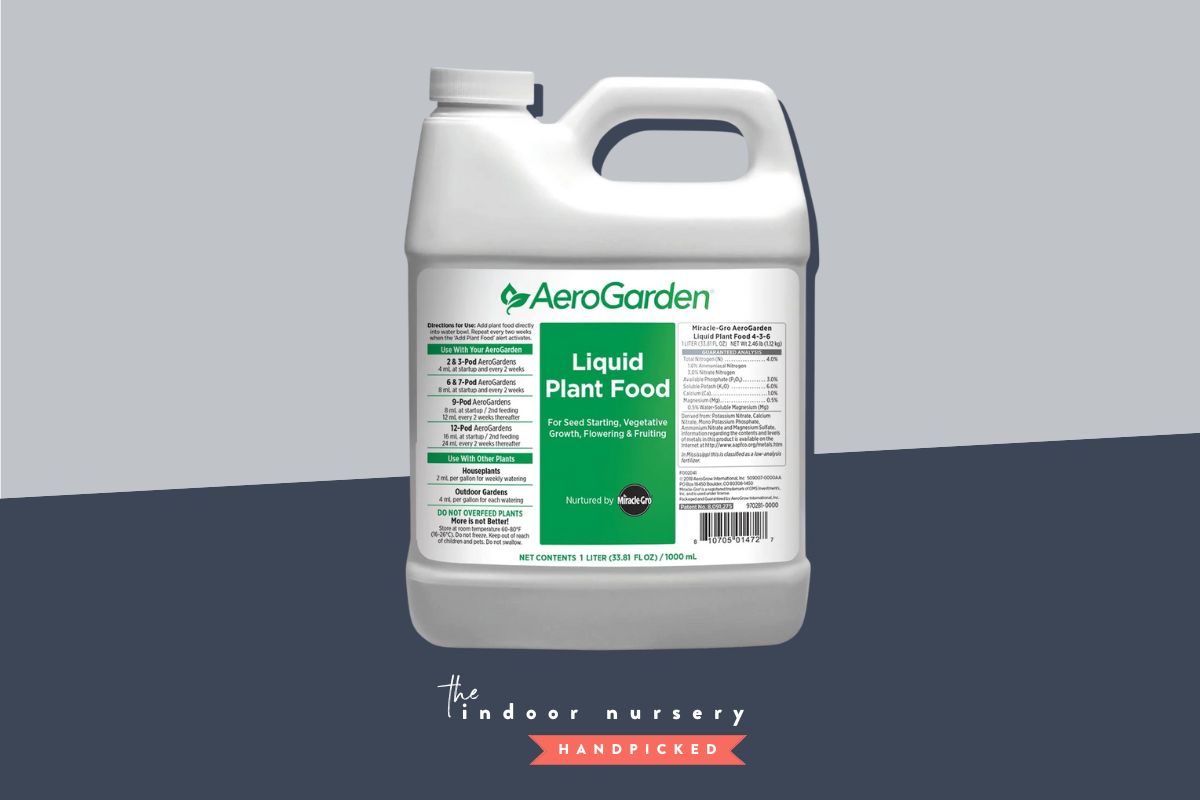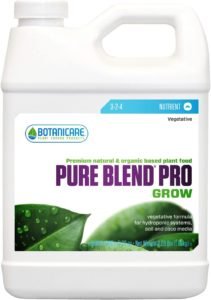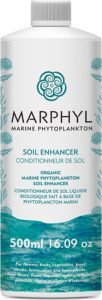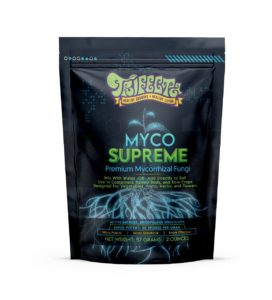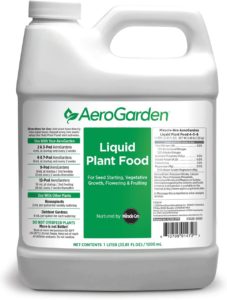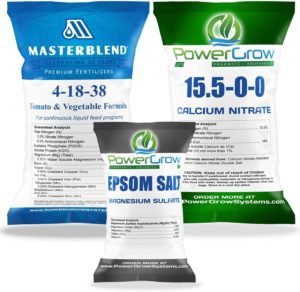🧪 Our review process
Our testing team independently researches, tests, and recommends the best products to help keep your houseplants absolutely thriving. Learn more about our testing and review process here.
Finding the best hydroponic fertilizer ensures that your indoor garden is lush and full of ever-growing life. These mineral-rich solutions provide the ideal growing environment for greater yields with higher-quality plants in a shorter amount of time.
But selecting the right hydroponic fertilizer for your garden isn’t always easy. It takes trial and error to find the perfect blend, and even then, you may need to make adjustments as time goes on.
To help you get off to a successful start, we’ve rounded up some of the best hydroponic fertilizers on the market today.
Our top picks
Whether you’re looking for an all-purpose nutrient solution or something a little more specialized, our top picks have you covered. From organic, premade mixtures to DIY custom blends, these fertilizers will make hydroponic gardening even easier.
1. BEST OVERALL: Botanicare Pure Blend Pro Grow
Spoil your plant babies with all the nutrition they need to blossom with this nutrient-rich fertilizer from Botanicare.
Product Specs
- Type: This is a liquid fertilizer.
- Size: This fertilizer comes in 1-quart, 1-gallon, and 5-gallon sizes.
- NPK: The NPK ratio is 3-2-4.
The major perk of hydroponics is that it eliminates the need for soil, but that also means your flora is totally dependent on you for sustenance. Botanicare’s terpene-enhancing solution is a favorite among veteran and beginning indoor gardeners alike as it improves both the flavor and the color of your plants. Plus, the NPK ratio strikes what many people believe to be the perfect balance of nitrogen, phosphorus, and potassium for maximum plant vitality.
Derived from sources like fish meal, composted seabird guano, kelp, rock phosphate, potassium carbonate, magnesium carbonate, and calcium carbonate, this popular fertilizer can be used throughout every stage of plant growth. Reviewers love the easy directions and how well their hydroponic gardens are responding. One person even said that their “vegetable plants grow faster and are more productive” since switching to Botanicare.
Pros
- Improves plant taste and vibrancy
- Ideal NPK ratio and balance
- Derived from natural sources
Cons
- Higher shipping costs and fees
- Requires a little mixing
2. BEST BANG FOR THE BUCK: MARPHYL Organic Liquid Fertilizer
This all-natural solution from MARPHYL is proof that not all hydroponic fertilizers come at a hefty price tag.
Product Specs
- Type: This is a liquid fertilizer.
- Size: This fertilizer comes in 16.9-ounce, 1.05-gallon, 33.8-ounce, and 67.6-ounce sizes.
- NPK: The NPK ratio is 0.19 – 0.001 – 0.07
Between the LED lighting, air pumps, and other hydroponic accessories, the cost of setting up an in-home garden can add up quickly. MARPHYL Organic Liquid Fertilizer helps keep your wallet happy without skimping on quality by giving you an organic solution that’s jam-packed with beneficial microbes, marine phytoplankton, and other minerals. And because it’s harvested 100% naturally, it’s free of GMOs, preservatives, toxins, and animal products.
The best part? It can be used as an all-purpose fertilizer for both hydroponic and traditional gardens alike. You can drench your soil with it, spray it on leaves, or and even use it to treat your lawn. Reviewers note that their plants are greener, more robust, and even “perk up” after one application. One person even called this stuff a “miracle in a bottle.” The initial fertilizer smell is apparently a little strong, but most people say it goes away pretty quickly.
Pros
- All-natural and toxin-free
- Multi-purpose solution
- Affordable and great value
Cons
- Initial smell may be strong
- Smaller bottles require regular re-buying
- Has lower NPK ratio
3. BEST POWDER: Trifecta Myco Supreme
Indoor gardeners looking to pack the most nutrient punch should leverage the power of this potent mycorrhizae strain.
Product Specs
- Type: This is a powder fertilizer.
- Size: This fertilizer comes in 2-ounce, 6-ounce, 13-ounce, and 5.5-pound bag sizes.
- NPK: The NPK ratio is unclear.
Most fertilizers are a colorful mix of minerals, but this unique batch from Trifecta is primarily made up of all-natural mycorrhizae spores specifically designed to improve the strength and vitality of your plants. Mycorrhizae are beneficial fungi that help your flora absorb more nutrition from the soil and better manage water intake. And this particular strain—Rhizophagus Irregularis—is supposedly a game-changer in terms of increasing root size.
While many brands include mycorrhizal on their ingredient list, no fertilizer is quite as concentrated as Trifecta’s. In a small, 2-ounce package, you’ll find 50 spores per gram which is the equivalent of up to 141,000 propagules per oz—20 times more than the average competitor. Reviewers back up the claims, saying that their plants look healthier and their “root growth went into overdrive.”
Pros
- Contains high concentration of mycorrhizae
- Increases root size and vitality
- Improves water and nutrition intake
Cons
- No NPK ratio listed
- More expensive than other brands
- Requires some prep and mixing
4. BEST LIQUID: AeroGarden Liquid Nutrients
Keep your hydroponic systems well-fed and well-hydrated throughout all their seasons with this PH-balanced liquid formula.
Product Specs
- Type: This is a liquid fertilizer.
- Size: This fertilizer comes in a 1-liter bottle.
- NPK: The NPK ratio is 4-3-6.
It’s no secret that hydroponic systems need a steady supply of nutrients to reach their maximum potential—and nothing beats AeroGarden’s highly-concentrated blend of minerals and trace elements. Specifically designed for germination and vigorous growth, it’s packed with key elements like phosphorus, calcium and magnesium that trigger the release of micronutrients critical for healthy root, stem and leaf development. Plus, it’s pH-balanced to ensure the best absorption of nutrients into your plants’ cells.
While it’s technically made to work with AeroGarden’s system, it pairs well with any other propagation or hydroponics setup. Reviewers note that while the price is high, the one-liter bottle will last you a long time as you only need to use it every two weeks. The dispenser may be a little tricky to pour, but most customers said they eventually got the hang of it.
Pros
- Highly concentrated with ideal NPK
- PH-balanced for best absorption
- Long-lasting bottle size
Cons
- More expensive than other brands
- May be tricky to pour
5. BEST DIY KIT: MASTERBLEND 4-18-38 Complete Combo Kit
Embrace your inner mixologist and craft custom-fit blends with this comprehensive kit.
Product Specs
- Type: This is a powder fertilizer.
- Size: This fertilizer comes in 2.5-pound, 5-pound, 12.5-pound, 25-pound and 62.5-pound sizes.
- NPK: The NPK is customizable.
Will the real green thumbs please stand up? If you’re a bit of an indoor gardening connoisseur—or want to become one—you’ll find everything you need to make your own nutrient-rich formula with this all-in-one kit from MASTERBLEND. It comes equipped with three concentrated components you can mix and match to your specifications: MasterBlend 4-18-38, Calcium Nitrate 15.5-0-0, and epsom salt (magnesium sulfate).
These ingredients provide a broad spectrum of minerals and trace elements that your plants need to flourish, including nitrogen for foliage growth and vibrant color, phosphorus for root development and prolific blooms, potassium for water intake and healthy cell walls. Plus, the epsom salt balances pH levels, allowing for better nutrient absorption. Reviewers are all about this kit’s versatility and potency, with one person saying that they’re “running out of room” for their rapidly growing plants.
Pros
- Customizable NPK and mineral ratio
- Mix and match components
- Highly concentrated minerals and nutrients
Cons
- Requires more work and prep
- Not ideal for beginners
our verdict
While every fertilizer on our list offers up a unique set of benefits, our top picks would have to be Botanicare Pure Blend Pro Grow and AeroGarden Liquid Nutrients. Both offer highly concentrated ingredients, ideal NPK ratios and tons of consumer-provided evidence of their effectiveness.
Our recommendations
| # | Preview | Product | |
|---|---|---|---|
| 1. | BEST OVERALL: Botanicare Pure Blend Pro Grow | View on Amazon | |
| 2. | BEST BANG FOR THE BUCK: MARPHYL Organic Liquid Fertilizer | View on Amazon | |
| 3. | BEST POWDER: Trifecta Myco Supreme | View on Amazon | |
| 4. | BEST LIQUID: AeroGarden Liquid Nutrients | View on Amazon | |
| 5. | BEST DIY KIT: MASTERBLEND 4-18-38 Complete Combo Kit | View on Amazon |
How we chose the best fertilizer for hydroponics
Your plants won’t thrive without proper nutrition—especially in the absence of soil. That’s why concentrated ingredients and ideal NPK ratios were top criteria. Because different gardeners have different ideas of what macro- and micronutrients work best, we offered a range of level options.
We also dug deep into customer reviews to get a better idea of how the fertilizers performed, paying special attention to whether or not they worked throughout the growing cycle and how easy measuring and mixing was. And finally, we opted for formulas that provided a good value in terms of size and purchasing frequency.
Who needs hydroponic nutrients
Your plants need nutrients, and hydroponic fertilizer is the best way to deliver them. That’s why anyone who is operating a hydroponic garden should be using these specialized fertilizers. Without them, your plants won’t receive the necessary nutrition to grow and thrive, so investing in a quality product is of utmost importance.
What to know before you buy hydroponic fertilizer
Let’s get one thing clear: hydroponic fertilizer isn’t dirt. This specialty plant food contains a mix of minerals, micro-nutrients, and other components specifically designed for no-soil hydroponic gardening. And while most bags with a hydroponics label will do just fine, tailoring the combination to your plants can help your garden flourish even more.
Different plants respond better to different fertilizer forms, nutrient ratios, and pH levels. So think about what you’re growing and choose accordingly.
Types of hydro fertilizers
Whether you’re growing in a soil-less medium or just need to supplement your indoor garden’s nutrition, there are three forms of fertilizer available: liquid, powder, and homemade. All have the capability to maintain your crops’ health, but there are pros and cons to each regarding price and ease of use.
Liquid
Easily the most low-maintenance type available, liquid fertilizer comes pre-mixed to the correct concentrations and pH levels. There’s no mixing or measuring required, but what you gain in minimum fuss, you lose in flexibility. Plus, it’s heavier, which makes shipping it more expensive.
Powder
Much like liquid, powder fertilizer is pre-mixed and adjusted to the right pH levels. But in this form, you don’t have to worry about weight when shipping—which makes it a more affordable alternative for larger-scale projects. Plus, it doesn’t require a ton of effort. You just have to mix the dry powder with water, and you’re ready to go.
Nutrients
Hydroponics need the big NPK: nitrogen, phosphorus, and potassium. These essential plant nutrients help with photosynthesis, flowering, and fruiting—so they’re important to include in your garden’s nutrition plan. But micronutrients deserve just as must hype. Trace elements like magnesium, calcium, iron, and zinc can help with things like cell growth and resisting disease.
Growing stages
Your crops will have different nutritional needs at different stages of their lives. For example, seedlings need more nitrogen and potassium than mature plants, while fruiting plants tend to require additional phosphorus and potassium. Creating your own homemade fertilizer allows you to tweak the ratios throughout your plant’s life cycle, but there are pre-made formulas designed for each stage too.
Essential oils
Fertilizer—understandably—doesn’t smell the best. So some formulas include essential oils that can give your garden a more pleasant aroma. Not only that, but oils like clove and peppermint also have antifungal and antibacterial properties, which can help protect your plants from disease. Others, like lavender, can actually repel pesky bugs.
Tips for using hydro nutrients
Using fertilizer isn’t rocket science, but there are a few best practices to keep in mind. For starters, you can have too much of a good thing. Over-fertilizing can actually cause nutrient lockout, which will stop your plants from taking up what they need. So be sure to check the recommended dosage on the packaging before adding it to your system.
You’ll also want to keep your solution stored at a mild temperature, ideally between 65-75 degrees. High temperatures can breed algae, and cold ones can shock your plants and even delay development. And lastly, test the pH levels of your solution regularly—at least an hour after you add the fertilizer—to make sure they’re in the sweet spot for best absorption. The optimum pH range falls between 5.5-6.0 for most plants, though some might differ.
- Get clear on the recommended fertilizer dose before you add it to your plants to prevent overfeeding them.
- Store your solution at a mild temperature between 65-75 degrees.
- Test the pH levels of your solution an hour after adding fertilizer to best ensure absorption.
FAQs
Fertilizing your indoor garden can be a tricky endeavor, but it’s an essential part of keeping your plants healthy and happy. Whether you’re a beginner gardener or a seasoned pro, we’ve got you covered with our FAQs. Read on to learn more about the best hydroponic fertilizer for your needs—and get answers to all your burning questions.
Which NPK ratio is best for hydroponics?
An NPK ratio of 7-9-5 is best for hydroponics, as it provides the best balance of essential nutrients for healthy and robust growth.
How often should you fertilize hydroponics?
You should fertilize your hydroponic system every seven to 10 days to ensure plants have enough nutrients for healthy growth.
Can I use regular fertilizer for hydroponics?
Technically you can, but regular soil-based fertilizers won’t provide the same balance of nutrients that a hydroponic fertilizer offers.
Shop our recommendations
- The Best Hydroponic Tower For Indoor Gardening
- 10 Best Worm Composter Bins For Easy Homemade Compost
- The Best pH Meter For Soil
- The 6 Best Dehumidifiers For Grow Tents
- The Best Complete Indoor Hydroponic Grow System
- 5 Best Grow Light Strips For Indoor Plants
- TESTED: Aerogarden vs Click and Grow Smart Garden
- Our *hands on* MARS HYDRO TSW 2000 review (with photos)
- 7 Best Hygrometers For Indoor Plants
- The Best Coco Coir For Your Plant’s Healthiest Root System Ever

